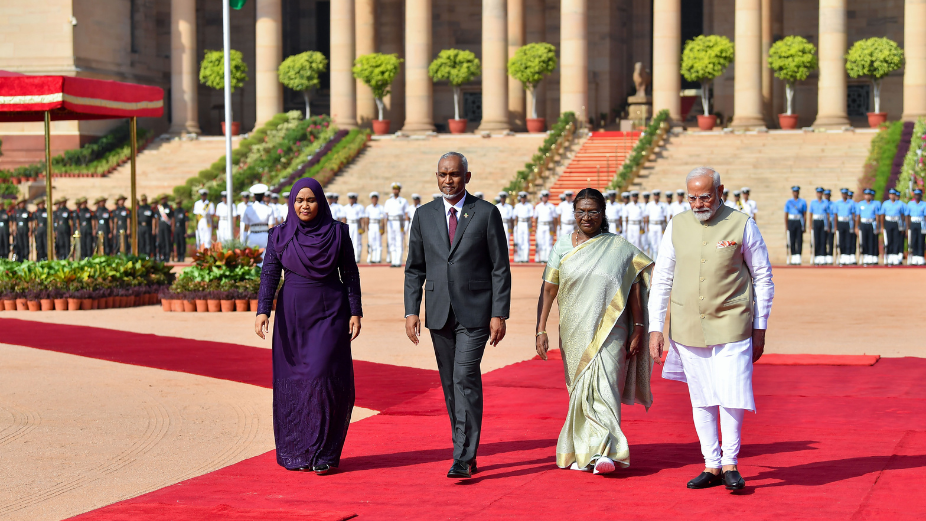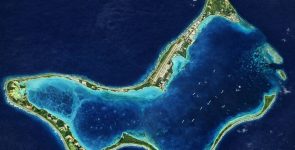
President Dr Mohamed Muizzu’s recent state visit to India from 6th to 10th October 2024 marked a significant milestone in Maldives-India relations. Stepping onto Indian soil for the first time as President, Dr Muizzu’s engagement with Indian leaders underscored the importance of a robust alliance between the two nations. This visit highlighted why maintaining a close relationship with India is not just beneficial but essential for the Maldives’ future.
A Historical Tapestry of Mutual Support
The Maldives and India share a rich history woven through centuries of cultural exchange and mutual assistance. India’s swift military intervention during the 1988 coup attempt in the Maldives is a testament to the deep-rooted alliance between the two nations. When the 2004 tsunami devastated the Maldives, India was among the first to offer aid, providing crucial support in rescue and rehabilitation efforts. Similarly, during the 2014 Malé water crisis, India airlifted drinking water to the island nation, reinforcing its role as a reliable neighbour.
Economically, India has been instrumental in the Maldives’ development. As of 2023, Indian tourists constituted one of the largest groups visiting the Maldives, significantly bolstering its tourism-dependent economy, especially during the low season. Indian investments have also flowed into various infrastructure projects, from building roads and housing to enhancing healthcare facilities, often facilitated through grants and credit lines.
Navigating Recent Strains and Shifts
The ascent of President Muizzu brought about a recalibration of the Maldives’ foreign policy, with a pronounced emphasis on national sovereignty and diversifying international partnerships. This shift led to tensions over the presence of Indian military personnel and the reconsideration of certain bilateral agreements. Speculations arose about the Maldives balancing its relations between India and China, especially when President Muizzu’s initial foreign visits did not include India, deviating from established tradition.
However, recognising the indispensability of India as a regional partner, efforts were made to mend and strengthen ties. The visit of India’s Minister of External Affairs, Dr Subrahmanyam Jaishankar, to Malé was a significant step towards reconciliation. High-level discussions focused on mutual priorities such as affordable housing, healthcare, and tourism, reflecting a shared commitment to navigate sensitive issues diplomatically.
The Significance of President Muizzu’s State Visit to India
President Muizzu’s state visit to India marked a watershed moment in bilateral relations. Meetings with President Droupadi Murmu, Prime Minister Narendra Modi, and other senior officials centred on deepening cooperation across various sectors. The visit culminated in a landmark joint press conference at Hyderabad House in New Delhi, where both leaders unveiled the “Comprehensive Economic and Maritime Security Partnership.”
Prime Minister Modi announced substantial economic support, including a USD 400 million currency swap agreement and INR 30 billion in budgetary assistance. The State Bank of India’s rollover of USD 100 million worth of Maldivian Treasury Bills was a critical move to alleviate the Maldives’ foreign exchange challenges. Infrastructure development featured prominently, with the virtual inauguration of the redeveloped Hanimaadhoo International Airport and commitments to expedite the Greater Malé Connectivity Project and the new commercial port at Thilafushi.
Economic Interdependence and Future Collaboration
Addressing the India-Maldives Business Forum in New Delhi, President Muizzu extended an invitation to Indian businesses to explore investment opportunities in the Maldives. He outlined an ambitious economic agenda focused on diversifying the Maldivian economy beyond tourism. Key initiatives include the launch of the Maldives International Financial Centre in early 2025 and the establishment of the Development Bank of Maldives, set to become operational in the coming months.
Digital connectivity was another focal point. The introduction of the RuPay card service in the Maldives and plans to link the Unified Payments Interface (UPI) between the two countries are poised to revolutionise financial transactions and enhance e-commerce opportunities. “I believe that private investments will continue to play a vital role in elevating our economies,” President Muizzu stated, emphasising the importance of private sector engagement in driving growth.
Maritime Security and Regional Stability
Given its strategic location in the Indian Ocean, the Maldives plays a crucial role in regional maritime security—a priority for both nations. The reaffirmation of defence ties includes training and capacity-building for the Maldives National Defence Force and the progression of the Ekta Harbour Project. India’s invitation for the Maldives to join the Colombo Security Conclave as a founding member further underscores the collaborative efforts to enhance security in the region.
Climate Change: A Shared Responsibility
The existential threat of climate change looms large for the Maldives, one of the world’s most vulnerable nations to rising sea levels. Both countries have committed to promoting sustainable development, with India offering expertise in solar energy and energy efficiency. President Muizzu pledged to meet 33% of the Maldives’ energy requirements through renewable sources by 2028, highlighting the nation’s commitment to environmental sustainability.
Diplomacy Suited to the Maldivian Context
For the Maldives, a small nation navigating the complexities of international relations, diplomacy must be both strategic and nuanced. The recent engagements with India reflect an understanding that while diversifying foreign partnerships is important, maintaining a close alliance with its immediate neighbour is paramount. This approach ensures that the Maldives can leverage opportunities for development while safeguarding its sovereignty.
The Maldives’ diplomacy is best served by a policy of pragmatic engagement—strengthening ties with traditional allies like India while fostering cooperative relationships with other global powers. This balanced approach allows the Maldives to benefit from India’s support in areas such as economic development, infrastructure, and regional security, without becoming overly dependent on any single nation.
A Partnership for the Future
As the Maldives and India approach the 60th anniversary of diplomatic relations in 2025, the foundations laid during President Muizzu’s visit set the stage for a reinvigorated partnership. Mutual invitations for state visits and high-level dialogues signal a shared commitment to commemorating this milestone with tangible progress.
The “Comprehensive Economic and Maritime Security Partnership” is more than a bilateral agreement; it represents a vision for the future—one where both nations collaborate closely to address common challenges and pursue shared goals. As President Muizzu aptly noted at the India-Maldives Business Forum, “Let us work together towards a brighter future for all.”
The Maldives’ imperative to maintain a close relationship with India is anchored in historical ties, economic interdependence, and shared strategic interests. India’s role as a reliable partner in times of crisis and as a catalyst for development cannot be understated. For the Maldives, employing a diplomacy that balances national sovereignty with constructive engagement is essential.
By fostering strong ties with India, the Maldives can confidently navigate the evolving geopolitical landscape of the Indian Ocean region. This alliance not only enhances the nation’s security and economic prosperity but also contributes to regional stability. As the waves of change continue to shape global dynamics, the Maldives’ close relationship with India remains a steadfast anchor, guiding the nation towards a future of sustained growth and mutual respect.












